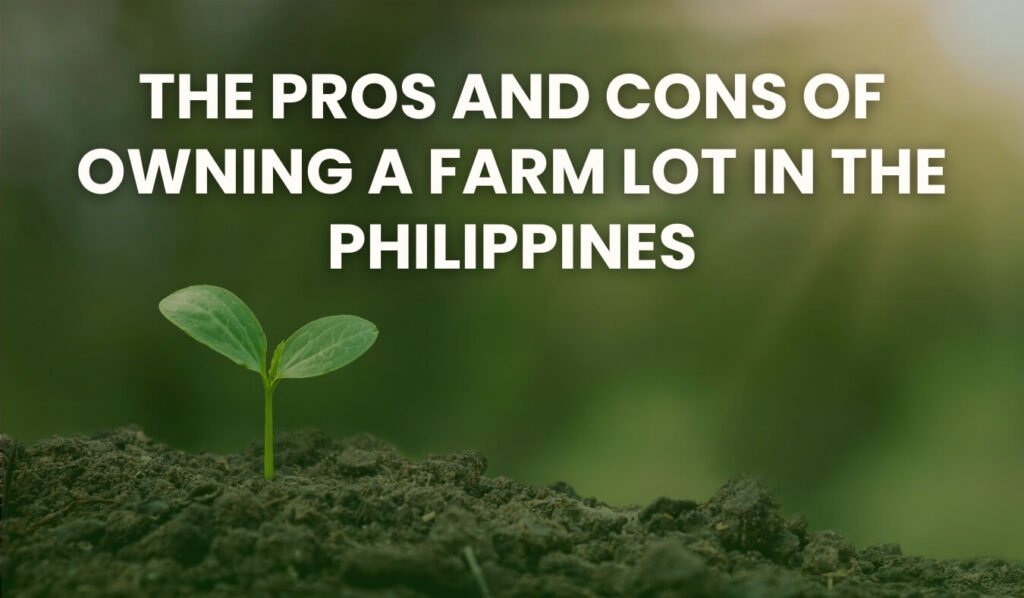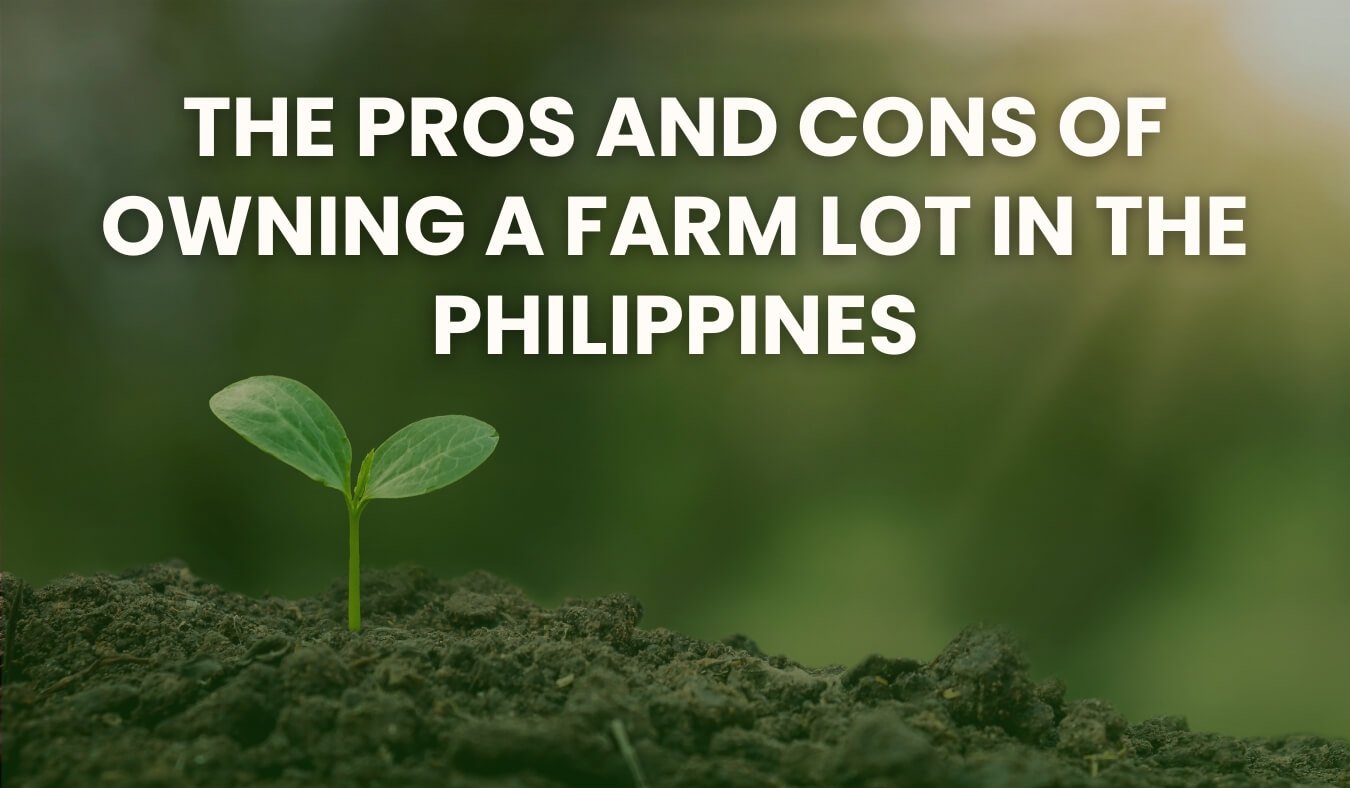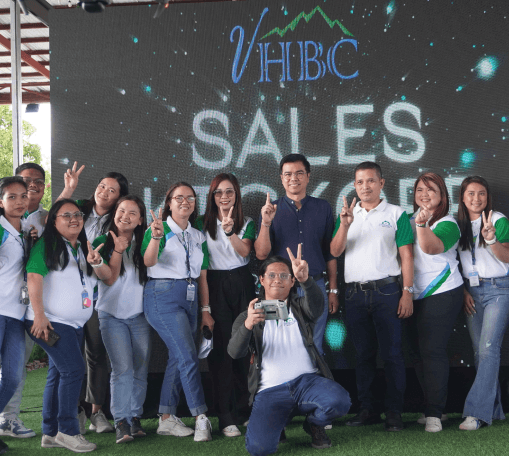Farm lot ownership is becoming an increasingly attractive investment in the Philippines, especially among local investors, CEOs, doctors, and high-income individuals seeking stability, privacy, and long-term value. Whether you’re planning for future agricultural ventures, leisure living, or simply diversifying your real estate portfolio, owning a farm lot offers both exciting opportunities and unique challenges.
In this comprehensive guide, we explore the pros and cons of farm lot ownership so you can make a well-informed decision aligned with your lifestyle and financial goals.
Why Farm Lots Are Gaining Popularity in the Philippines
With urban congestion, rising property prices in Metro Manila, and a growing interest in sustainable living, many investors are turning their attention to farm lots. Beyond their appeal as a rural getaway, farm lots now serve multiple functions—from weekend retreats to agri-tourism hubs and high-value investment properties.
In leisure communities such as Mountain View Leisure Community and East West Breeze Leisure Farm and Resortdeveloped by VHermosa Bright Corp., buyers are enjoying scenic landscapes, eco-friendly living, and solid return potential.
The Pros of Owning a Farm Lot in the Philippines
1. Diverse Investment Opportunities
Owning a farm lot gives you access to several income-generating options:
Agricultural production (e.g., fruits, vegetables, livestock)
Leasing for farming or tourism
Converting into eco-resorts or wellness sanctuaries
Unlike urban lots, farm lots can serve both personal and business purposes—especially when located in high-potential areas like Batangas, Cavite, or Laguna.
2. Capital Appreciation Over Time
Well-located farm lots in leisure communities have shown consistent appreciation in value. As infrastructure projects like new highways and eco-tourism zones expand, farm lots within these vicinities tend to gain higher market value.
3. Healthier Lifestyle and Wellness
Away from the smog and noise of the city, farm lot owners can enjoy clean air, homegrown food, and reduced stress. For high-level professionals like doctors and executives, it’s an ideal way to escape and recharge.
4. Tax Incentives for Agricultural Use
Under the Philippine law, agricultural lands can benefit from lower real property taxes compared to residential or commercial lots. This makes them cost-effective to maintain long-term—especially for absentee landowners.
5. Ideal for Leisure and Retirement
Farm lots are ideal for retirement planning. Many are located within leisure farm communities that offer the convenience of gated security, utilities, and recreational facilities—perfect for relaxing getaways or permanent homes.
6. Privacy and Seclusion
If you value privacy, a farm lot offers you space and exclusivity that urban condominiums simply can’t match. This is one of the main reasons high-class individuals and celebrities invest in rural properties.
7. Sustainable Living and Food Security
More investors are turning to sustainable and organic farming, growing their own produce, and living self-sufficiently. In times of food supply disruptions, owning a farm lot ensures resilience and security.
The Cons of Owning a Farm Lot in the Philippines
1. Zoning and Land Use Restrictions
Not all farm lots are created equal. Some may be classified strictly for agricultural use and cannot be developed into residential or commercial properties without proper conversion permits. It’s important to check the land classification through the Department of Agrarian Reform (DAR) and HLURB.
2. Maintenance and Management
Farm lots require regular maintenance—land clearing, fencing, pest control, and security. If you don’t plan to live onsite, you’ll need to hire caretakers or property managers, which adds to your costs.
3. Limited Liquidity
Unlike condos or city lots, farm lots typically take longer to sell. The buyer pool is more niche, which can delay liquidation if you’re looking to cash out quickly.
4. Infrastructure Limitations
Some rural areas may lack proper access roads, water systems, or electricity. While leisure communities like those developed by VHermosa Bright Corp. offer complete amenities, not all farm lots provide this convenience.
5. Natural Disasters and Environmental Risks
Farm lots are exposed to floods, typhoons, or drought—especially in lowland or high-risk zones. It’s crucial to inspect the property and review environmental reports before purchase.
6. Agricultural Law Complications
If your lot is covered by the Comprehensive Agrarian Reform Program (CARP), certain legal limitations may apply. You might not be able to subdivide, sell, or lease the land freely unless specific requirements are met.
Comparison Table: Pros and Cons of Farm Lot Ownership
| Pros | Cons |
|---|---|
| Multiple income options (farming, tourism, leasing) | May require land conversion for residential use |
| High capital appreciation in prime locations | Ongoing maintenance costs |
| Fresh air, clean environment, peaceful living | Limited resale liquidity |
| Lower property taxes for agricultural land | Some areas lack complete infrastructure |
| Ideal for retirement and long-term investment | Exposed to climate and natural risks |
| Sustainable and eco-friendly lifestyle | Legal zoning restrictions in some areas |
| Increased privacy and exclusivity | Requires time and effort to manage |
Tips Before Buying a Farm Lot in the Philippines
1. Verify Land Title and Zoning Classification
Always check for clean titles and determine whether the land is zoned for agricultural, residential, or mixed use.
2. Consider Buying in a Leisure Community
Projects like Mountain View Leisure Community and East West Breeze Leisure Farm & Resort offer ready infrastructure, gated security, and future resale potential.
3. Assess Nearby Developments
Proximity to roads, hospitals, schools, and tourist sites boosts the land’s value. Government projects like CALAX or South Luzon Expressway extensions can also increase long-term ROI.
4. Evaluate Soil Quality and Water Access
If you plan to farm or grow crops, check if the soil is fertile and whether water sources are available year-round.
5. Consult a Real Estate Expert
Speak with professionals or accredited developers like VHermosa Bright Corp. to avoid hidden costs and legal complications.
Who Should Invest in Farm Lots?
Farm lot ownership is best suited for:
High-net-worth individuals seeking long-term land banking
Executives or doctors looking for leisure or retirement options
Businessmen exploring agribusiness or tourism ventures
Families building a second home in the countryside
Investors aiming for land appreciation in 5–10 years
Final Thoughts: Is a Farm Lot Right for You?
Understanding the pros and cons of owning a farm lot in the Philippines is essential before you invest. For those seeking peace, profit, and potential, farm lots in the right location can deliver incredible returns—both financially and personally.
With the rise of leisure communities and increased interest in sustainable living, now is a smart time to explore farm lot investments with trusted developers like VHermosa Bright Corp..
Ready to See It for Yourself?
Schedule a Free Site Viewing Today
Experience the tranquility and investment potential of a farm lot by visiting our prime developments in Batangas and nearby provinces.
👉 Book a Viewing
Outbound Links for Reference & Credibility
Here are some reliable external sources to support your research and decision-making regarding farm lot ownership in the Philippines:
Department of Tourism – Agri-Tourism Initiatives
Learn more about the government’s support for agri-tourism in rural areas.
👉 https://www.tourism.gov.phFood and Fertilizer Technology Center – Land Use Conversion in the Philippines
Understand the legal process of converting agricultural land for residential or commercial use.
👉 https://ap.fftc.org.tw/article/1229Lawyer Philippines – Legal Guidelines on Land Reclassification
Detailed explanation of zoning, land use laws, and agrarian reform implications.
👉 https://www.lawyer-philippines.com/articles/reclassification-of-agricultural-land-to-commercial-zoning-in-the-philippinesGrant Thornton Philippines – Tax Incentives for Food Providers (Sagip Saka Act)
Explore available tax exemptions and financial benefits for agricultural landowners and producers.
👉 https://www.grantthornton.com.ph/insights/articles-and-updates1/lets-talk-tax/tax-incentives-for-food-providersAllProperties – Real Property Tax and Idle Land Tax Guidelines
Review tax responsibilities and consequences of keeping agricultural land idle.
👉 https://www.allproperties.com.ph/real-property-tax-philippinesVHermosa Bright Corp. – The Future of Farm Lot Investments in the Philippines
Explore trends, risks, and opportunities in farm lot ownership through an expert local lens.
👉 https://vhbc.com.ph/the-future-of-farm-lot-investments-in-the-philippines




























